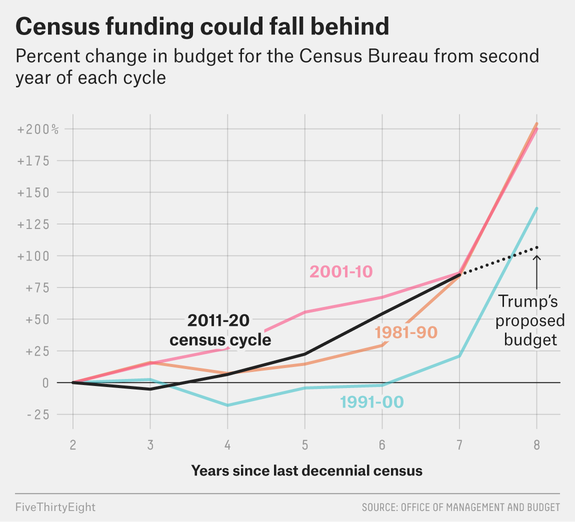While most pundits and politicians were focused on the bombshell firing of Federal Bureau of Investigation Director James Comey last night, many of the economists and policy wonks of the world were focused on a different departure entirely. Yesterday afternoon, John Thompson, the director of the United States Census Bureau and the man tasked with executing the 2020 census, resigned. While Thompson and the Department of Commerce haven’t detailed his reasons for resigning, there’s widespread speculation that it’s due to funding concerns over the 2020 census. (Secretary of Commerce Wilbur Ross was also reportedly unhappy with Thompson’s rocky congressional testimony last week about cost overruns with a new census system.)
Generally, in the two to three years before the census, the Census Bureau significantly ramps up its spending—field tests of new methods have to be run, census takers have to be hired, the process itself has to be publicized and marketed. Census watchdog groups, however, are warning that the Trump administration and Congress are in danger of dramatically underfunding the 2020 census.
“In late April Congress approved only $1.47 billion for the Census Bureau in the 2017 fiscal year, about 10 percent below what the Obama administration had requested,” wrote the Washington Post’s Tara Bahrampour. “And experts say the White House’s proposed budget for 2018, $1.5 billion, falls far below what is needed.”

This chart to the left, from FiveThirtyEight, illustrates the dramatically slower ramp-up in census funding in comparison to years past.
While the resignation of the director of the Census Bureau may not seem like as politically turbulent as the firing of the director of the FBI, it’s worth pausing to consider the enormous importance of having accurate census data, especially in light of this administration’s somewhat casual approach to statistics and facts. For starters, the government uses decennial census data to define legislative districts and apportion seats in the House of Representatives. The 2020 redistricting is expected to be a particularly important (and political) process in light of the GOP-friendly redistricting that occurred around the country in 2010—in fact, Barack Obama announced last fall that redistricting reform will be one of his primary post-presidency areas of focus.
But it’s not just fair redistricting and representation that’s dependent on accurate census data. Policymakers also use census data to divvy up federal funds for programs such as public health and education, and to make decisions about where to build schools and various infrastructure projects. Researchers use census data to study things like migration, poverty, local economic trends, and the effectiveness of social programs. Businesses use census data to craft long-term marketing and hiring strategies.
Since 1790, the U.S. has counted itself every 10 years, as mandated by the Constitution. The Founding Fathers viewed this “enumeration” as a bedrock of our democracy. Let’s hope Thompson’s resignation isn’t a sign of threats to come.





